
A government agency was spreading dangerous rumors about the coronavirus vaccine, playing on people's religious beliefs to sow chaos, Reuters revealed last week. Was it Russia? China? Iran, perhaps? The culprit turned out to be someone closer to home: The U.S. military.
Both the Trump and Biden administrations signed off on a psychological operation aimed at discrediting Chinese-made vaccines, using fake social media accounts to target foreign countries, Reuters reported. The program ended in late 2021, after executives at Facebook and officials from other U.S. government agencies raised concerns about the content.
It's far from the only time Washington spread dodgy rumors and straight-up lies through fake online accounts. The anti-vax campaign is the latest in a series of pro-American disinformation campaigns that have been exposed over the past few years. While the U.S. government warns about the use of "fake or misleading personas" to "amplify conspiracy theories," it also uses the exact same tactics to sow distrust against China, Russia, and Iran.
A 2023 strategy document by the U.S. military, for example, calls on U.S. forces to "weaponize information to manipulate an adversary's perception of reality by influencing and disrupting social systems and technical connections that are foundational to a modern society. Disinformation, misinformation, and propaganda can trigger a chain of events in an adversary's society that gradually degrades its domestic unity, undermines societal trust in its government and institutions, and diminishes its international stature."
Such chaos is an opportunity "to prevent [enemies] from opposing U.S. actions, or to better position U.S. joint forces in the event of armed conflict," the document states.
But the anti-vax campaign stands out because of the subject matter. The U.S. government has long been worried about "vaccine hesitancy" and people's mistrust of medical authorities at home. But they encouraged vaccine hesitancy and sowed doubt about medical authorities abroad—as if foreigners' reactions to the pandemic would not have an effect on America.
"WE SHOULD NOT TRUST THOSE MED SUPPLIES BY CHINA REALLY. Everything is fake! Face mask, PPE, and test kits. There is a possibility that their vaccine is fake," said one U.S. military–sponsored Twitter account, posing as a Filipino man. "COVID came from China. What if their vaccines are dangerous??"
Another fake Filipino account implied that the vaccine contained rat poison. The campaign also targeted foreign Islamic audiences, arguing that Chinese vaccines were made with pork, which is considered unclean by Muslims. That's simply not true: Chinese pharmaceutical company Sinovac says that its coronavirus vaccine is "free of porcine materials."
"We weren't looking at this from a public health perspective," a senior military officer told Reuters. "We were looking at how we could drag China through the mud."
Vaccines became a political issue in May 2020, when the United States and China both ramped up their vaccine development programs. That month, while U.S. President Donald Trump announced an "America First" vaccine development program, Chinese leader Xi Jinping said that China would treat its vaccine as a "global public good."
Whatever benefits each approach had, other countries obviously preferred to deal with the program that would get their citizens vaccinated faster, which gave China an opportunity to win goodwill abroad. The U.S. military was especially alarmed when the Philippines, a U.S. ally, asked China for vaccines and promised to soften its line on Beijing.
"We didn't do a good job sharing vaccines with partners," another senior U.S. military source, who was "directly involved" in the psychological operation, told Reuters. "So what was left to us was to throw shade on China's."
How ironic. While one part of the U.S. government was struggling to convince American citizens to get vaccinated—even pressuring social media companies to curtail "inaccurate information" about vaccines—another part was using those very social media platforms to spread outright lies discouraging vaccination.
It eventually became too much for the Biden administration's National Security Council, which ordered the military to stop. After the anti-vax campaign was shut down, an internal U.S. military investigation uncovered several other psychological operations that were "many, many leagues away" from acceptable, an official told Reuters.
In August 2022, a network of fake accounts believed to be run by the U.S. military was shut down. Some of them had been spreading the rumor that Iranian doctors were stealing organs from Afghan refugees. So much for restoring trust in medical authorities.
The post A Real-Life Psyop: How the U.S. Military Spread Anti-Vax Conspiracy Theories appeared first on Reason.com.







